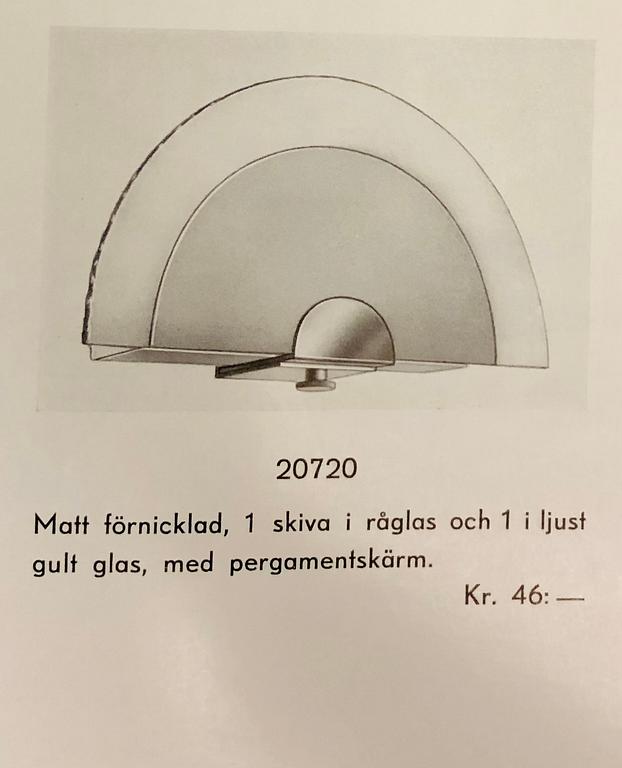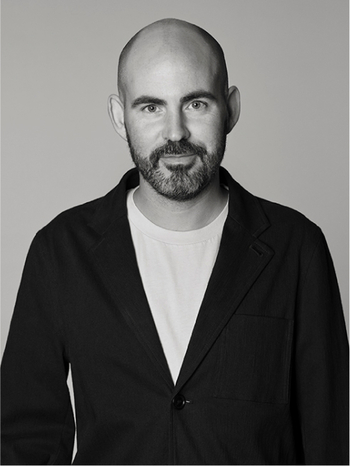Erik Tidstrand
a pair of wall lamps, model "20720", Nordiska Kompaniet 1930s.
Fixture in nickel-plated metal, shade in raw glass and one in yellow glass, three lamp sockets each, width 43 cm, height 25 cm, depth from wall 11 cm.
Minor wear and chips.
Literature
Depicted in the Nordiska Kompaniet catalog of 1937.
More information
A unique collection of lighting fixtures from Nordiska Kompaniet
Alongside Nordiska Kompaniet’s (NK) renowned furniture department led by Axel Einar Hjorth, there existed a thriving lighting department that is relatively unknown today. This fall, Bukowskis will share the story of NK’s lighting department, which held a prominent position during Sweden’s golden age of design from the 1920s to the 1950s. They created fixtures for various important interiors and exhibitions of the time. Nordiska Kompaniet is an integral part of Swedish design history. The brand was founded in 1902, and merely two years later, in 1904, NK’s factories were established in Nyköping. These factories played a pivotal role in the company’s success, contributing to the renowned quality that would define NK’s reputation. Employing around 500 workers, the factories became the largest industry in Nyköping. In NK’s factories, a wide range of fixtures, including custom-made and mass-produced options, were designed by the company’s leading lighting architects, including Erik Tidstrand, Bertil Brisborg, Olle Elmgren, and others. In addition to creating fixtures for department stores, they were also involved in prestigious interior design projects, producing lighting fixtures for significant locations like Stockholm City Hall, the Concert Hall, the American Line flagship M/S Kungsholm, Tändstickspalatset, as well as renowned restaurants, theaters, and cinemas. The collection being presented at Modern Art + Design spans from the 1920s to the 1950s and exemplifies distinctive styles of the era, such as Swedish Grace and Swedish Modern.
NK’s lighting department - a hidden treasure
NK’s lighting department quickly rose to become a pioneering fixtures company in Sweden, ushering in a new era of innovative designs and modern aesthetics. These fixtures were prominently displayed on the third floor, while a small workshop for manufacturing and assembly of lamps was also located within the department store. In the 1920s, Nordiska Kompaniet initiated a collaboration with Orrefors, the leading art glass manufacturer of the time. NK’s architects, Erik Tidstrand and Olle Elmgren, partnered with Orrefors’ designers, Simon Gate and Edward Hald, to create exclusive lighting fixtures for public spaces, as well as for NK’s and Orrefors’ own product lines. This collaboration led to a range of fixtures, including those for the Concert Hall in Stockholm and M/S Kungsholm, among others. Orrefors was responsible for crafting the glass details and shades, while Erik Tidstrand and his team at NK designed and constructed the fixtures. These were then produced in the metal factories in Nyköping.
Designer
Erik Tidstrand was the head of the lighting department at Nordiska Kompaniet from 1901 until 1941 and retired in 1943. He began his career at Leja and KM Lundberg, which later merged to form Nordiska Kompaniet (NK) in 1902. Tidstrand is considered one of the most significant lighting architects in Swedish lighting history during the first half of the 20th century. Examples of his successful collaborations include Ivar Tengbom's fixtures for the Concert Hall and the Tändstickspalatset, and Carl Bergsten's interior design for the passenger ship M/S Kungsholm. Another notable collaboration was the lighting he developed in partnership with NK's chief architect, Axel Einar Hjorth, for the interior design of Tössebageriet and Centrum-huset in Stockholm. Tidstrand's fixtures were showcased at numerous prestigious national and international exhibitions during the first half of the 20th century, a period when Swedish Grace was the prevailing design ideal. These exhibitions included the 1925 World Exhibition in Paris, the 1929 World Exhibition in Barcelona, the 1930 Stockholm Exhibition, the 1937 World Exhibition in Paris, and many more.
Read more
















































